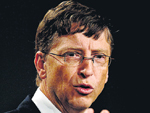|
Gates trades Microsoft spotlight for charity work SAN FRANCISCO, (Reuters) Bill Gates transformed his boyhood hobby into a sprawling software empire called Microsoft that made him the world's richest person and one of the most successful entrepreneurs ever. Yet Gates was never as ostentatious about his immense wealth as some other high-tech billionaires and the Harvard dropout said on Thursday he plans to reduce his role at the company he co-founded to pour his energy into giving away his billions rather than developing software.
He and his wife, Melinda, have already donated tens of billions of dollars to various causes and their foundation -- which aims to improve education and health around the world -- is one of the biggest charity funds in history. Gates also frequently speaks and writes on issues such as fighting cancer and AIDS, and has invested hundreds of millions of dollars of his personal fortune in biotechnology companies. “With great wealth comes great responsibility,” Gates told Thursday's news conference, where he said that by July 2008 he will have completed his job transition to the foundation. His decision came as little surprise to analysts and others in the industry, since Gates had already handed over the reins as chief executive. But the man who blazed an entrepreneurial path for dozens of high-tech tycoons will certainly no longer cast the same shadow on the industry. Gates, 50, will stay on as Microsoft's chairman past his 2008 transition date but handed his title as chief software architect to Ray Ozzie, the programmer who created Lotus Notes before joining Microsoft Corp. last year. In overseeing the world's largest software company, Gates came to be known for his aggressive style of management -- he used to dismiss suggestions with the put-down, “That's the stupidest thing I've ever heard!” -- and what some have called ruthless business tactics. During his time at Microsoft's helm, Gates took on governments who accused his company of acting like a monopoly and crushed industry rivals like Web browser Netscape who tried to compete. But he handed the chief executive job to Steve Ballmer in 2000 and took up his role as chief software architect to get away from the daily grind of running Microsoft so he could concentrate on his first love: developing software. Gates was born Oct. 28, 1955, the second of three children in a prominent Seattle family. His father, William Henry Gates Jr., was a partner at one of the city's most powerful law firms, while his late mother, Mary, was an active charity fund-raiser and University of Washington regent. Gates found his calling at Seattle's exclusive Lakeside Preparatory School, where as a 13-year-old prodigy he began programming in the BASIC computer language on a primitive ASR-33 Teletype unit. It was at Lakeside that Gates met Paul Allen, a student two years his senior who shared his fascination with computers and would one day help him start Microsoft. “Of course, in those days we were just goofing around, or so we thought,” Gates recalled in his book “The Road Ahead.” During the two years he spent at Harvard University, Gates devoted much of his time to programming marathons and all-night poker sessions before dropping out to work on software for the Altair, a clunky desktop computer that cost $400 in kit form. Gates and Allen soon relocated to Albuquerque, New Mexico, where they established Microsoft in 1975. They named the company for its mission of providing microcomputer software, which Gates was convinced would become more important than hardware. The company's big break came in 1980 when Gates and his carelessly dressed young colleagues signed an agreement to provide the operating system that became known as MS-DOS for International Business Machines' new personal computer. In what ended up being a critical blunder on IBM's part, Microsoft was allowed to license the operating system to other manufacturers, spawning an industry of “IBM-compatible” machines dependent on Microsoft's operating system. In March 1986, Microsoft stock went public in
one of the most celebrated offerings of its time. By the next year,
the company's soaring stock price had made Gates the youngest self-made
billionaire, at age 31. |
||||
Copyright © 2006 Wijeya Newspapers
Ltd. All rights reserved. |
